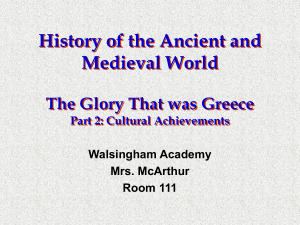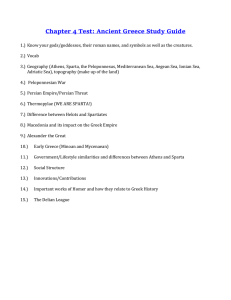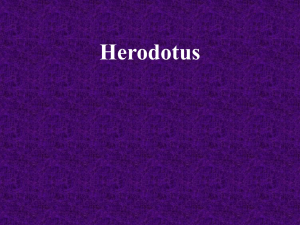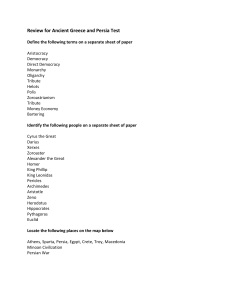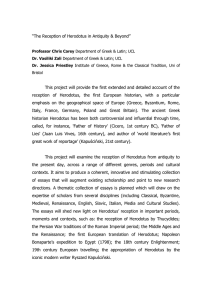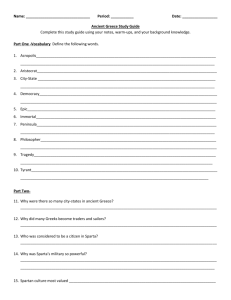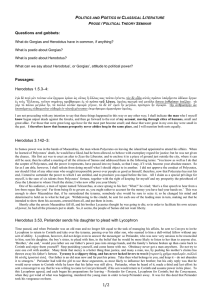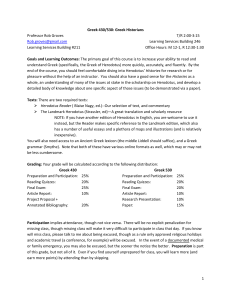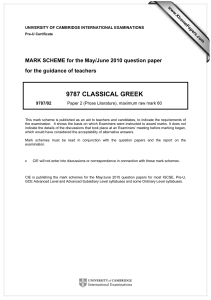Herodotus: Father of History or Lies? Historiography Analysis
advertisement
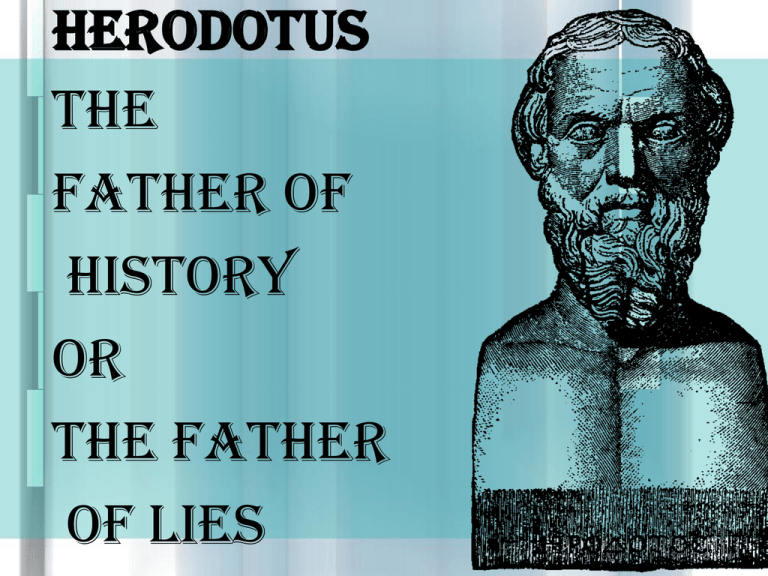
HERODOTUS THE FATHER OF HISTORY Or THE FATHER OF LIES The History of History Oral Tradition Pre History Organized Narrative 5th Century onwards Enlightenment -rational thought, detracted from religious thought 18th century Academic Discipline -impact of science 19th century Crisis Annales, Women’s History Post Modernism 20th century Overcome the crisis Broader view of History 21st century Increasing professionalism and more democratic HISTORIOGRAPHY • ‘the history of any event is never precisely the same thing to two different persons and it is well known that every generation writes the same history in a new way, and puts upon it a new construction’ • Carl Becker FRAMEWORK • HISTORIAN- BRIEF BIO • PERSONAL, SOCIAL AND HISTORICAL CONTEXT • CONSTRUCTION, LINEAR OR MULTIPLE NARRATIVES, ANALYTICAL ( HOW ) • LANGUAGE AND STYLE ( HOW ) • PURPOSE ( WHY?) • HISTORICAL TECHNIQUES ( METHODOLOGY) • ARTICLES FROM READINGS AND SIGNIFICANT QUOTES CONTEXTUAL BIAS • Historians work reflect their personal , social and historical context • Personal Context will be anything that has happened in the individuals life that may impact on their view and writing of history • Social Context will include any social, cultural or political aspects of the time • Historical Context is the broadest and includes changing ways of writing, viewing events and wars and philosophical understanding PERSONAL CONTEXT • • 484?-425 BC, Greek historian, known as the father of history, • Born in Halicarnassus, Believed to have been exiled from Halicarnassus about 457 BC for conspiring against Persian rule. He traveled throughout Asia Minor, Babylonia ,Egypt, and Greece. The direction and extent of his travels are not precisely known, but they provided him with valuable firsthand knowledge of virtually the entire ancient Middle East. • • About 447 BC he went to Athens, then the center and focus of culture in the Greek world, where he won the admiration of the most illustrious men of Greece, including the great Athenian statesman Pericles. • WHAT ASPECTS OF HIS PERSONAL LIFE MIGHT IMPACT ON HIS WRITING??? SOCIAL CONTEXT • The universe, he believed, is ruled by Fate and Chance, and nothing is stable in human affairs. • Moral choice is still important, since the gods punish the arrogant. This attempt to draw moral lessons from the study of great events formed the basis of the Greek and Roman historiographical tradition Herodotus as an elite saw and wrote about the events of the upper classes and significant individuals ORAL PURPOSE; HOMERIC TRADITION • In Herodotus' time his works were mostly given orally to the public. As not everybody could read and the price of reproducing the works were cost prohibitive. HISTORICAL CONTEXT • The 5th century saw conflict between the Persian empire and the Greek States between 490-478 BC • The next 40 years saw the growth of Athenian Power and Democracy • The final years saw Athens and Sparta engage in the Peloponnesian Wars with Sparta as the victor 5TH CENTURY GREECE PURPOSE "These are the researches of Herodotus of Halicarnassus, which he publishes, in the hope of thereby preserving form decay the remembrace of what men have done, and of preventing the great and wonderful actions of the Greeks and the foreigners from losing their due need of glory; and withal to put on record what were their grounds of feud." COMMEMMORATIVE FOCUS AND CONSTRUCTION • The History has been divided by later authors into nine parts. – The earlier books deal with the customs, legends, history, and traditions of the peoples of the ancient world, including the Lydians, Scythians, Medes, Persians, Assyrians, and Egyptians. – The last three books describe the armed conflicts between Greece and Persia in the early 5th century BC. – In the History the development of civilization moves inexorably toward a great confrontation between Persia and Greece, which are presented as the centers, respectively, of Eastern and Western culture. METHODOLOGIES • Herodotus's information was derived in part from the work of predecessors, but it was widely supplemented with knowledge that he had gained from his own extensive travels. Herodotus, we are told consulted witnesses and examined monuments whenever possible but introduced an extraneous element into his historical thinking in relying also on dreams, oracles and portents. (undermines the historical work) • Although he was sometimes inaccurate, he was generally careful to separate plausible reports from implausible ones. In THE Words of Herodotus • “There is a story that the Priestess also revealed to him the systems of government which obtains at Sparta today but the Lacaedemonians themselves say that Lycurgus brought it from Crete” • “The following are certain Persian customs which I can describe from personal knowledge.” • Persian fleet on its way to Greece-they were caught by a violent northerly gale…..a great many of them were driven ashore and wrecked on Athos- indeed reports say that something like three hundred were lost with over 20,000 men. The sea in the neighbourhood of Athos is full of monsters….were seized and devoured.” • “So much for the Argive account…there is however another story current in Greece. • For my own part I cannot positively say that Xerxes either did or did not send the messengers to Argos…” Anne Curthoys Is History Fiction? • “ Herodotus constructs the Histories in terms of a free wheeling multiplicity of genres, which like the many stories he tells, play off against each other, sometimes tragic, ironic, comic.” • What characterizes The Histories as a project of historical writing and so what launches Western historical writing, is its doubleness; the concern for history as a field, a discipline, an enquiry, with associated research protocols, combined with the interest in storytelling…..Herodotus does not confine history to an area or field of focus, rather establishing historical writing as freely economic, political, diplomatic, social sexual, religious, military or naval.”
